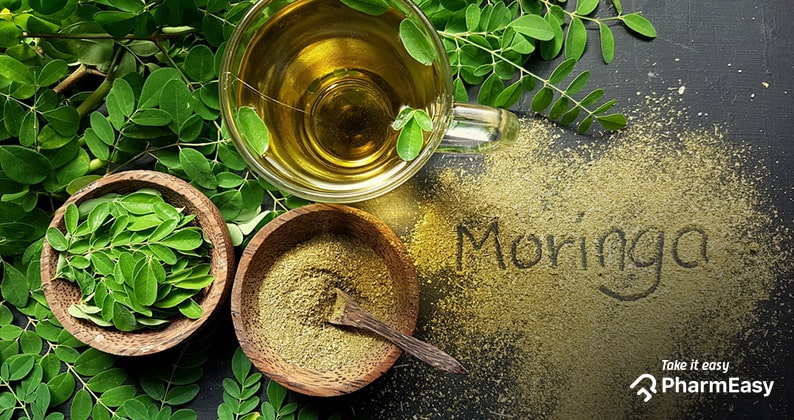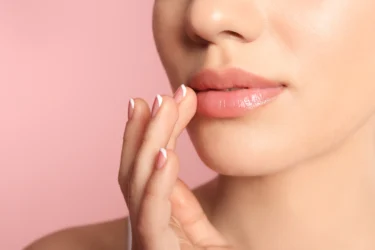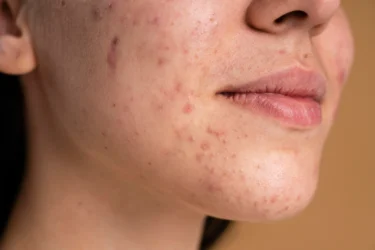Amazing Benefits of Moringa for Your Skin!
By Dr. Raina N. Nahar +2 more

Get,

to manage your symptom
Get your,


4 Cr+ families
benefitted

OTP sent to 9988776655



You’ve successfully subscribed to receive
doctor-approved tips on
Whatsapp

Get ready to feel your best.

Hi There,
Download the PharmEasy App now!!


Register to Avail the Offer
Send OTPBy continuing, you agree with our Privacy Policy and Terms and Conditions

Hi There,
Sign up on PharmEasy now!!
Trusted by 4 crore+ families

OTP sent to 9988776655



You have unlocked 25% off on medicines




Code: NU25

Comments


Leave your comment here
By Dr. Raina N. Nahar +2 more
Table of Contents
There is often a close connection between feeling good and looking good, which is a sentiment shared by many. For those who prefer to avoid chemical-based products, turning to natural alternatives can be a thoughtful choice. In doing so, one may come across the potential uses of moringa in skincare1.
Before exploring its applications, let us first gain an understanding of moringa.

Moringa is a herb that has been used for centuries for its various health benefits. It is obtained from the Moringa Oleifera tree, native to Africa and Asia. Moringa is commonly processed into oil and is found in many skincare products such as skin creams, perfumes, conditioners, and shampoos.
It is also frequently used in massage oils due to its ease of absorption, which can help leave the skin feeling soft and smooth. Moringa is valued for its composition, which includes vitamins, minerals, amino acids, and moisturising fatty acids; these components contribute to its popularity in skincare applications1.
The Moringa plant, also known as Drumstick, is commonly found throughout India, where its leaves and pods are widely used in traditional cuisine. Rich in antioxidants and bioactive plant compounds, moringa serves as a valuable source of nourishment. These natural components are also known to support overall skin health, contributing to a healthy and radiant appearance.
Dr. Arpit Verma, MBBS, MD (Pharmacology)
Moringa has many nutrients that are considered beneficial for skin health. It is a source of vitamin A, which plays a role in the production of collagen, a key structural protein in the skin. It also provides vitamin C, which is known to support the skin’s natural defences and is associated with reducing visible signs of ageing. In addition, moringa contains vitamin E, which is recognised for its anti-inflammatory properties and its role in supporting skin barrier function.
Let us now explore the potential benefits of incorporating moringa into your skincare routine.

Moringa powder and oil support are often used in skincare due to their potential to support skin vitality and slow the visible signs of ageing. They may help rejuvenate dull or dry skin, largely owing to their antioxidant content. Antioxidants are known to help protect the skin by reducing the effects of free radicals, which can contribute to tissue damage and the appearance of wrinkles.
Moringa is also a source of vitamin C, which plays a role in the natural repair of skin cells. Additionally, it contains cytokinins, which are plant hormones that are believed to support cellular function and may help minimise cell degradation. These properties are of interest for maintaining skin firmness and elasticity2,3.
Furthermore, the antioxidant properties of moringa may offer some degree of protection against environmental stressors, including exposure to ultraviolet (UV) rays. Moringa is also noted for its traditional use in soothing minor skin irritations. It is believed to possess antiseptic qualities and has been used in various forms to support the care of minor cuts, abrasions, bruises, insect bites, and sun-exposed skin. However, while these applications are part of traditional practices, individuals should seek appropriate medical advice for serious or persistent skin conditions1.

As moringa is known to have moisturising properties, moringa is commonly included in lip balms and creams. It helps to maintain soft, smooth lips by providing hydration and nourishment, making it a useful addition to daily lip care routines3.

Due to its antibacterial properties, moringa is helpful in preventing acne breakouts on your skin. It also helps remove blemishes, dark spots, pimples and blackheads. To achieve clear skin, you can apply a paste of moringa leaves on the spots of your face.
While moringa is valued for its topical applications, it may also offer benefits when included as part of a balanced diet. Moringa powder or seeds are traditionally consumed for their nutrient content, and some believe they may support the body’s natural detoxification processes. Since the accumulation of internal toxins is often associated with skin concerns such as acne, a well-functioning system may contribute to a clearer complexion6.
Additionally, moringa is known to contain nutrients that support collagen production, which plays a role in maintaining skin firmness. This may help improve overall skin texture and reduce the appearance of enlarged pores3. However, further research is needed to substantiate these effects through clinical studies.

Moringa oil is often used as a moisturiser and may also assist in improving overall skin complexion. It is traditionally believed to help reduce the appearance of dark spots, acne marks, and other minor skin blemishes, promoting a smoother and more even skin tone. A similar effect is sometimes attributed to preparations made from mashed moringa leaves4.
While these uses are common in traditional skincare practices, it is advisable to consider individual skin sensitivities and consult a healthcare professional for persistent or severe skin concerns.
Did you know?
Also Read: Effective Care and Natural Masks for Acne
Moringa can be used for skincare by preparing a face pack or face mask at home, which may be applied regularly as part of a skincare routine.
Here are the items you will need to make a moringa face mask:
Procedure:
If lemon juice is used in along with this face mask, it is advisable to avoid direct exposure to sunlight immediately after rinsing the mask off, as this may increase the risk of skin irritation or damage. For optimal results, it is recommended to apply the face mask in the evening.
Also Read: 21 Healthy Benefits Of Almonds: Facts And FAQs
Moringa is not only beneficial for the skin but also supplies essential nutrients to the body. Incorporating this herb into your daily routine may support overall health and help maintain clear skin but is advised to use under the supervision of a healthcare professional.
Also Read: 7 Reasons Why Vitamin C Is Good For Your Skin
Although uncommon, some individuals may develop skin irritation or a rash in response to moringa, possibly due to allergies or sensitivity to certain plant compounds. It is recommended to perform a patch test prior to extensive use and to seek medical advice if any adverse reactions occur.
Yes, moringa can cause skin irritation in some individuals, especially those with sensitivities or allergies to the plant. Symptoms may include redness, itching, or rash. It’s advisable to perform a patch test before using moringa products extensively and discontinue use if any adverse reactions occur.
Yes, moringa oil is often beneficial for sensitive skin due to its gentle and non-comedogenic properties. It’s lightweight, easily absorbed, and rich in antioxidants and fatty acids, which can help soothe and moisturise sensitive skin without causing irritation. However, individuals with sensitivities should still perform a patch test before widespread use.
Moringa offers various benefits for the skin, including moisturising and nourishing properties due to its rich content of vitamins, minerals, and fatty acids. It also possesses antioxidant and anti-inflammatory properties, which can help protect the skin from damage caused by free radicals and reduce inflammation, promoting healthier, and more radiant skin.
Yes, moringa oil is a lightweight and non-comedogenic oil, making it suitable for use on the face. Its high content of antioxidants, vitamins, and fatty acids can help moisturise, nourish, and protect the skin, while its anti-inflammatory properties may soothe irritation and promote a healthy complexion. Always perform a patch test before regular use to ensure compatibility with your skin
Moringa contains vitamin C and other antioxidants known for their skin-brightening properties, which may contribute to a gradual lightening of the skin over time. However, individual results may vary, and it’s important to use moringa products consistently and in conjunction with a comprehensive skincare routine for best results. Consulting with a dermatologist can provide personalised advice.
While moringa has been traditionally used for various skin conditions due to its anti-inflammatory and antimicrobial properties, scientific evidence supporting its efficacy in curing skin diseases is limited. However, incorporating moringa into skincare routines may offer benefits such as moisturisation and soothing effects, but consulting with a healthcare professional for the proper diagnosis and treatment of skin diseases is recommended.
Moringa may assist in managing skin pigmentation due to its antioxidant properties and high content of vitamins and minerals, potentially helping in achieving a more even skin tone.
Moringa’s skin-tightening effects are attributed to its high antioxidant content, which may help improve skin elasticity and firmness. While individual results may vary, incorporating moringa into skincare routines could potentially contribute to a tighter and more youthful-looking complexion.
1. Pareek A, Pant M, Gupta MM, Kashania P, Ratan Y, Jain V, et al. Moringa oleifera: An Updated Comprehensive Review of Its Pharmacological Activities, Ethnomedicinal, Phytopharmaceutical Formulation, Clinical, Phytochemical, and Toxicological Aspects. International Journal of Molecular Sciences [Internet]. 2023 Jan 20 [cited 2025 May 28];24(3):2098. Available from: https://www.ncbi.nlm.nih.gov/pmc/articles/PMC9916933/
2. Klimek-Szczykutowicz M, Gaweł-Bęben K, Rutka A, Blicharska E, Tatarczak-Michalewska M, Kulik-Siarek K, et al. Moringa oleifera (drumstick tree)-nutraceutical, cosmetological and medicinal importance: a review. Frontiers in Pharmacology [Internet]. 2024 [cited 2025 May 28];15:1288382. Available from: https://pubmed.ncbi.nlm.nih.gov/38370483/
3. Potency of moringa (Moringa oleifera L.) leaves extract containing quercetin as a depigmentation agent inhibiting the tyrosinase enzyme using in-silico and in-vitro assay [Internet]. ResearchGate. 2024 [cited 2025 May 28]. Available from: https://www.researchgate.net/publication/357938237_Potency_of_moringa_Moringa_oleifera_L_leaves_extract_containing_quercetin_as_a_depigmentation_agent_inhibiting_the_tyrosinase_enzyme_using_in-silico_and_in-vitro_assay
4. Raissa TH, Rosmalina A. Article Review: Moringa Plant (Moringa oleifera Lamk.) as a New Candidate for Anti-Acne. Jurnal Biologi Tropis [Internet]. 2024 Jun 26 [cited 2025 May 28];24(2):845–52. Available from: https://www.researchgate.net/publication/382118605_Article_Review_Moringa_Plant_Moringa_oleifera_Lamk_as_a_New_Candidate_for_Anti-Acne
5. Patel Z, Patel R, Gandhi Y, Patel R. Exploring the Cosmetic Benefits of Moringa Powder: A Natural Solution for Skin and Hair Care [Internet]. [cited 2025 May 28]. Available from: https://www.ijfmr.com/papers/2024/6/31081.pdf 14.
6. Ali A, Akhtar N, Chowdhary F. Enhancement of human skin facial revitalization by moringa leaf extract cream. Advances in Dermatology and Allergology/Postȩpy Dermatologii i Alergologii [Internet]. 2014 May 1 [cited 2025 May 28];31(2):71–6. Available from: https://www.ncbi.nlm.nih.gov/pmc/articles/PMC4112252/
7. Sarkar D, Das S, Kalita P, Pathak BJ, Judder MI, Datta K, et al. Traditional Indian Medicinal Plants for the Treatment of Psoriasis: A Review of Active Constituents and their Pharmacological Effects. Journal of Natural Remedies [Internet]. 2023 Aug 31 [cited 2025 May 28];785–90. Available from: https://www.researchgate.net/publication/373607726_Traditional_Indian_Medicinal_Plants_for_the_Treatment_of_Psoriasis_A_Review_of_Active_Constituents_and_their_Pharmacological_Effects
Disclaimer: The information provided here is for educational/awareness purposes only and is not intended to be a substitute for medical treatment by a healthcare professional and should not be relied upon to diagnose or treat any medical condition. The reader should consult a registered medical practitioner to determine the appropriateness of the information and before consuming any medication. PharmEasy does not provide any guarantee or warranty (express or implied) regarding the accuracy, adequacy, completeness, legality, reliability or usefulness of the information; and disclaims any liability arising thereof.
Comments

Leave your comment...

View all comments(5)
You may also like
Nice
Please, can one make the mixture of moringa, honey and avocado pear for keeps? if yes, for how long?
Nice lesson…thanks a lot
Should one take it morning and evening or once in the morning
I haven’t use it before